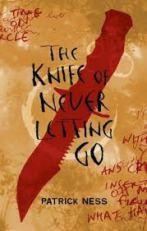 This is a tough book to review, so I’ll start by telling you that A Monster Calls is one of the best books I’ve read, and so if you haven’t read Patrick Ness yet, you must.
This is a tough book to review, so I’ll start by telling you that A Monster Calls is one of the best books I’ve read, and so if you haven’t read Patrick Ness yet, you must.
That said, I liked this book a lot but it didn’t all work for me. It begins with a very inventive story, and it’s non-stop action throughout, but very emotional at the same time. And Ness’ writing is like poetry at times.
Todd is a 12-year old in a small “New World” town. He’s the youngest boy in town, for this reason: after he was born, a virus killed all the women. When the settlers came to Prentisstown, there was a war with the native species, the Spackles (check), and the Spackles killed off all the women. They were killed off in turn. So this town of all men is getting older, and smaller, with each passing year. When Todd turns 13, he becomes an adult, and that means there are no children left.
The other important thing about this “New World” is the Noise. Everyone can hear each other’s thoughts, so there’s no hiding anything, and no quiet. The best you can do is try to cover up your thoughts or drown out other people’s thoughts, but mostly everyone just lives with it.
It’s a very eerie setting for a book, and right off the bat we sense there is a lot that Todd doesn’t know. He’s forced to flee from his home but doesn’t understand why. Then he meets a girl, Viola, who can hear his thoughts but he can’t hear hers.
There’s a hole in the Noise.
Which can’t be.
It’s weird, it is, out there, hiding somewhere, in the trees or somewhere outta sight, a spot where your ears and your mind are telling you there’s no Noise. It’s like a shape you can’t see except by how everything else around it is touching it. Like water in the shape of a cup, but with no cup. It’s a hole and everything that falls into it stops being Noise, stops being anything, just stops altogether.
In some ways, this is a journey story for Todd, Viola, and his talking dog Manchee. He’s only seen one town in his life, but he’s about to encounter other towns with different truths, and different ways of life. Ness pays a lot of attention to language and dialect, which varies by town. For example, Todd comes from a place that doesn’t value learning, so he never learns to read, and speaks a rougher, more phonetic dialect. If you don’t like reading in dialect, this will bother you, but I always find language fascinating.
One of the most interesting things about this book is how differently each town views women and gender. Todd is torn between society’s need for him to be a violent, aggressive male, and Viola’s need for him not to give in to that violence.
What didn’t work as well for me was the sense of religious symbolism and ideas in this book. One of the villains is a religious zealot, although we never have a sense of what that religion is. There’s a lot of discussion of what it means to be “fallen.” For some reason that means even if his life is in danger, he shouldn’t kill. There’s a lot about the importance of innocence, and hope. I found the language and symbolism heavy-handed at times.
The other problem is that this book is DARK. I read plenty of fiction that I describe as dark, or violent, or difficult to read. But the misery in this book just comes at you again and again. It’s raw and ugly and violent, and was just a bit too much for me. I kind of wanted it to stop at some point.
This is a powerful book, and it’s the first part of a trilogy, so of course this is only part of the story. But I’m not quite sure if I’ll read the next one.

